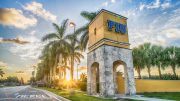Guethshina Altena/ Assistant News Director
On Sept. 25, students faculty and staff assembled with FIU Student Media to discuss the topic of free speech and its denotation in relations with college campuses.
The panelists for the forum were Elizabeth Marston, Deputy General Counsel at FIU; Police Chief Alexander Casas of FIUPD; Dr. Larry Lunsford, VP of Student Affairs; Antoine Hard, professor at CARTA, who moderated the debate and Tom Julin, first amendment lawyer.
“Most of our significant social movements in our country has started at Universities and has started as a ground slow demonstration and issues that i’ve been brought to national attention,” Casas said.
Casas explains that the police department monitors demonstrations to keep things under control and identify potential agitators when students gather to exert their right to free speech.
“So we get that and we are here to protect that and enable that so everything we do is to further that exact [process]…in a way that everyone is safe and the business of FIU and education continues without any impediment,” he said
Veronica Rushton, a senior broadcast media major, attended the forum out of curiosity and interest. She is
“The thing that stuck out the most to me in the forum was how the university goes about handling controversial issues on campus,” she said.
Being a broadcast media major, Rushton deals with topics of this sort in her classes and daily life. Yet, she admits to gotten new perspective from attending the forum.
“I learned that there was free speech zones both MMC and BBC. I also learned a little about what each panelist have to go through when it comes to handling free speech on campus,” she said.
Casas continues to explain that the police provides balance at protests and counter protests to create an environment where everyone can express themselves freely and safely.
“What we look at when it comes to protesting and what you can or can’t do is when the activity that you are doing is interfering, disrupting or impeding the normal operations of the University and that means classes going on, research going on, the business of FIU going on,” Chief Casas said.
In cases like this, police would approach the people disrupting the protests and ask them to tone it down or stop the act.
“The University have designated free assembly areas according to policy but that policy very much recognizes, this is our University and it belongs to our students so our have a lot more access to locations where they can do their demonstrations, their rallies and their protest that the general public does not necessarily have,” said Casas.
There are four places at MMC where students can assemble: the fountain in between the Graham Center, the Green Library, Deuxieme Maison and Primera Casa. The other locations are the open grassy north of Graham Center entrance, the grassy of GC parking lot, the south area of the Health and Sciences building, and Gold Garage area.
At BBC, there are two place to assemble: around the Academic Center One and north of Wolf University Center.
However, there are still rules that apply to students such as certain buildings that you can’t protest nearby, how far you can be from residential buildings and the library so the classroom environment are not disrupted.
In the past, Casas said the Police Department has helped monitor traffic to help students in their protest and rallies.
“From a policy perspective, from a regulation perspective, our department here and the university as a whole is very pro-students when it comes to these types of events,” Casas said.
Featured image by Nicole Malanga/PantherNOW






Be the first to comment on "Free speech forum educates students on their rights"